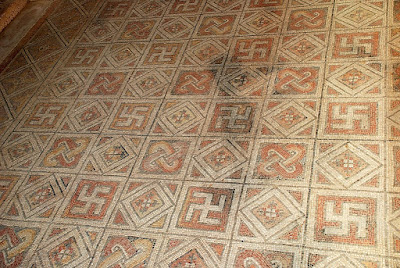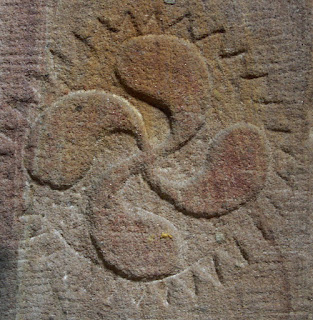Swastika Hysteria In Ontario’s Hinterland
| Street name in Puslinch Township, Ontario |
Seventy-two years after the surrender of Hitler Germany, national socialism is completely scrubbed from the face of the earth. Well, not entirely. One small village of indomitable Ontarians, Puslinch Township, still holds out against the forces of good — or so its detractors maintain. The point of contention: an old street of around 50 residents named “Swastika Trail.”
The Jewish advocacy group B’nai Brith Canada (BBC) started an online petitionto demand from the town council to rename Swastika Trail to something ‘less offensive.’ It argues that the “swastika is unequivocally a modern symbol of racism, hatred and death.” The petition will apparently be submitted on 20th December to the local council. It has been flanked by a media campaign in a number of national media outlets such as CTV news, CBC, The Star and National Post. All of them reproduce one and the same Canadian Press release, so I will rely here on the one from record.com.
When I spotted the headline, my first thought was what probably many people were thinking: “Somehow over the top, but rename the street and be done with it.” In other words: reasonable accommodation towards the suffering of the Jewish people in the 20th century. But the longer I reflected on it, the more presumptous this demand appeared to me.
In the following I will argue why the name of the street cannot be seen as offensive to Jewish people and why it should be retained as a true expression of Canada’s policy of multiculturalism.
Dispute On The Local Level
The single most important fact to consider is that the street is entirely unrelated to the history and ideology of national socialism:
Swastika Trail was named in the 1920s before the rise of Adolf Hitler in Nazi Germany, local residents said.
Notably, the lack of a connection isn’t disputed by BBC and those residents who press for a name change, otherwise they would have certainly brought it up. So the question is why should the name be changed despite its innocuous, non-Nazi background? Some residents cites personal reasons. They complain that their association with the street has a negative impact on their personal lifes:
“Having the word swastika on my provincially issued driver’s licence and my federally issued mailing address associates me with bigotry, intolerance and anti-Semitism,” said Jennifer Horton. “That’s not who I am and that’s not how I want to present myself.”
So feelings matter, Mrs Horton believes. A more relevant question, however, is how much the complainants are themselves responsible for their own situation. Were they born on Swastika Trail or did they move to it as self-responsible adults? The article is silent on this matter but if the latter is true, the complainants cannot simply argue that they were forced into their alleged stigma. They did have the freedom of choice and could have simply opted not to move to the street if they found its name so repugnant that they did not want to be associated with it. Thus, these people should not have a say or at least not to the same extent as those residents who lived on the street all their life. To give them equal say would be to deny their responsibility as grown-ups for their own life decisions.
From my personal experience too, I have to disagree with Mrs Horton’s account. I once lived in a street named after a communist, but never I was accused to be a Commie by virtue of my postal address (in that case, I would like to live on Casanova Road). People can tell the difference, it is not below their intelligence.
The dispute then went on to a democratic vote. We learn that
local residents on the street voted on the issue earlier this month among themselves, with a slight majority in favour of keeping the name.
Dispute From A National And Multicultural Perspective
One could say at this point ‘causa finita, the people have spoken,’ but the opponents quickly dismissed the local democratic process by arguing that
this is an issue that is not only affecting our street — this is an issue that affects our entire community, our whole country, so it’s not a matter of 50 people on a street having a vote.
They escalated then the dispute by bringing in openly the BBC to lobby for their cause. The BBC presented the issue as a full-blown moral crusade of good against evil:
This is your opportunity to stand on the right side of history, and make your town a more welcoming place for all Canadians. Streets must never be named after symbols of hate. Despite its ancient origins, the swastika is unequivocally a modern symbol of racism, hatred and death. Tens of millions of Canadians, and hundreds of millions across the globe, have had their lives destroyed by the Nazis who made the swastika their emblem.
So BBC appeals to Canadian nationals as well as humanity as a whole, basing its argument on a mixture of national and cosmopolitan sentiments. Do we Canadians have the moral obligation to support the renaming of the street? Let’s take first a brief look at the long history of the swastika.
 |
| Floor mosaic in an ancient Roman villa in Spain |
The swastika is one of the very oldest symbols of mankind and appeared already in the character repertoire of Neolithic proto-writing. In Europe its use dates back to more than 6,000 years before Adolf Hitler, to the Vinča culture in South-East Europe (cf. no. 70).1 It has also been one of the most widespread symbols of mankind, doubtlessly also due to its simple form. The list of the cultures which have been employing it in their symbology reads like a who is who of human civilization:
- India
- Iran
- China
- Armenia
- Greece
- Rome
- Germanic peoples
- Celts
- Slavs
- etc. etc.
Does BBC claim that all these high cultures and key historical people were on the wrong side of history? Many million descendants of them are living now in Canada as Canadian citizens. Many hundreds of millions of descendants are living all over the world. Why should their heritage be indiscriminately denounced as a “symbol of hatred”? The Canadian Multiculturalism Act from 1988 recognizes the freedom of all members of Canadian society to preserve and enhance their cultural heritage. If this act means anything, if the “multi” in multiculturalism is really meant to be inclusive, we cannot reduce cultural symbols to the one ‘morally right’ interpretation to the exclusion of the other traditions.
 |
| Hindu child |
Rather, we need to accept the cultural diversity and treat one heritage equally to the other. The swastika is for example a common symbol in Buddhism, Hinduism and Jainism which have a huge number of followers in Canada. It has thus a right to exist.
One might object that the “Swastika trail” has nothing to do with these eastern religions. True enough. But it has also nothing to do with Nazism, so why demand to change it?
Swastika opponents may counter that we should allow exceptions on religious grounds, but otherwise ban it “because hate.” But how paradox is it to be d’accord with the symbol’s use by one billion Buddhists, Hindus and Jainists, while pushing for a ban for fifty Canadians who are just as unconnected to national socialism? How much double think is necessary for this?
Nothing Wrong With The Swastika Per Se
As it is, the “Swastika Trail” of Puslinch Township belongs to one particular cultural group, that of the local Canadians who founded the place and live there. The respect for their proud heritage should be no less worth than that for other groups such as the Jews. Pressure should not be exerted from the outside to force the locals into changing their grown culture.
BBC invokes the memory of Canadian WWII veterans, but in doing so it turns the whole issue on its head. Canadian soldiers did not fight for national socialism but, remember, against it. So why should their descendants be obliged to remove the swastika from their vocabulary and symbology like the Germans? Why are the conditions of surrender now also applied to the then victors, including the Puslinch people who, I am sure, also had to pay a blood toll in the war? Why is their township denounced as an unwelcoming territory if they don’t follow the Judeo-centric interpretation of the swastika by B’nai Brith Canada? When did we came to the point that insistence on local Canadian tradition is lumped together with Nazi ideology? Puslinch and Canada as a whole still have nothing to do with the Holocaust.
 |
| Lauburu swastika in a Catholic church |
Furthermore, BBC completely ignores that “swastika” is only the generic name for a class of different signs. It treats the “Swastika Trail” as if it must refer to the sign peculiar to the national socialists. In reality there are many variations of the swastika. The Nazi version is actually called a Hakenkreuz, even in informed English parlance. The trail name, however, is unspecific as to the swastika’s shape and symbolic content and could thus refer to any one of a dozen different signs. So why does BBC connect it with the Hakenkreuz of all variants?
What BBC fails to recognize is that there is not the one interpretation of the swastika. Neither in a multicultural Canadian nor in a global context one people alone can reasonably claim to hold the definitional power over it. The swastika is a world heritage. There is nothing wrong with it per se. Only so in a national socialist context. Being of one of mankind’s very oldest and most venerable symbols its usage should not be governed by one particular political narrative, historical memory or moral monopoly.
And in this regard the political campaign of the BBC proves to be dishonest when it links the street in Puslinch to some Nazi graffiti in another town 90 kilometers away (Vaughn). This is moral blackmailing. Instead of demonizing the swastika regardless of its context, its use should be judged on the case by case basis that such a multifaceted, ancient symbol merits. “Swastika Trail” in Puslinch Township is perfectly ok. We aren’t going after every street which is named after a hammer or sickle either, are we?
